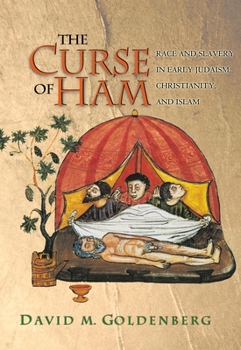The Curse of Ham: Race and Slavery in Early Judaism, Christianity, and Islam
Select Format
Select Condition 
Book Overview
How old is prejudice against black people? Were the racist attitudes that fueled the Atlantic slave trade firmly in place 700 years before the European discovery of sub-Saharan Africa? In this groundbreaking book, David Goldenberg seeks to discover how dark-skinned peoples, especially black Africans, were portrayed in the Bible and by those who interpreted the Bible--Jews, Christians, and Muslims. Unprecedented in rigor and breadth, his investigation covers a 1,500-year period, from ancient Israel (around 800 B.C.E.) to the eighth century C.E., after the birth of Islam. By tracing the development of anti-Black sentiment during this time, Goldenberg uncovers views about race, color, and slavery that took shape over the centuries--most centrally, the belief that the biblical Ham and his descendants, the black Africans, had been cursed by God with eternal slavery. Goldenberg begins by examining a host of references to black Africans in biblical and postbiblical Jewish literature. From there he moves the inquiry from Black as an ethnic group to black as color, and early Jewish attitudes toward dark skin color. He goes on to ask when the black African first became identified as slave in the Near East, and, in a powerful culmination, discusses the resounding influence of this identification on Jewish, Christian, and Islamic thinking, noting each tradition's exegetical treatment of pertinent biblical passages. Authoritative, fluidly written, and situated at a richly illuminating nexus of images, attitudes, and history, The Curse of Ham is sure to have a profound and lasting impact on the perennial debate over the roots of racism and slavery, and on the study of early Judaism, Christianity, and Islam.
Format:Hardcover
Language:English
ISBN:069111465X
ISBN13:9780691114651
Release Date:November 2003
Publisher:Princeton University Press
Length:480 Pages
Weight:3.05 lbs.
Dimensions:1.4" x 6.0" x 9.3"
Customer Reviews
1 rating
Race Bible and slavery
Published by Thriftbooks.com User , 20 years ago
Was Ham African? This book tries to divinate the truth and the origin of the 'curse of Ham' since over the generations many have perverted the bible to show that the descendants of Ham were African and were also meant to be slaves. The truth is a little different. Just as Atalantic slavers used the exuse that africans were not human to enslave them thus Muslims likewise used the excuse that africans could be enslaved as pagans. But the Bible was simply used as an easy way to not feel guilty about slavery. The reality was that slavery was practiced not just against Africans and that the race of Africans had little to do with slavery. Rather the slave trade seems to have been so long and prosperous in Africa due to the Africans being active participants, the lack of a unified empire in Africa to oppose slavery and the lack of other sources of humans to serve as slaves. After all we know that Rome enslaved the Gauls and other europeans. But when Europe developed a strong state the only europeans open to being enslaved where those colonized by the Ottomans. Likewise the depopulation that followed the Islamic conquest of the middle east meant that slaves could not come from thos eregions. Slaves certainyl couldnt be transported out of China. Thus Africa became the meat market for human cruelty, the sickness of slavery that eventually consumed and destroyed african soceity. But among the warrior tribes such as the Zulu we do not see enslavement, why? Because they dared to raise the sword against the Perverts who came to buy their daughters into slavery. The 'curse of Ham' had little to do with Africa rather it had more to do with Humans and the weakness of the state. Seth J. Frantzman






